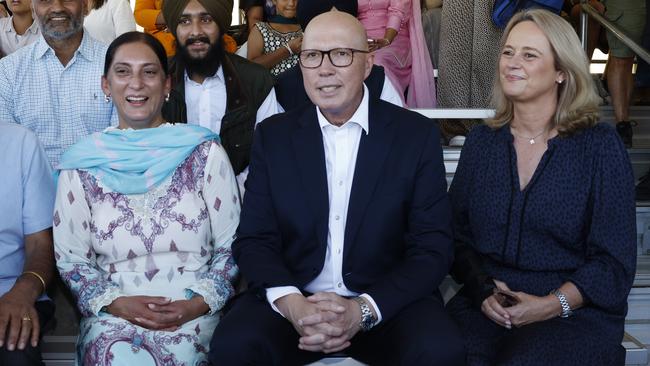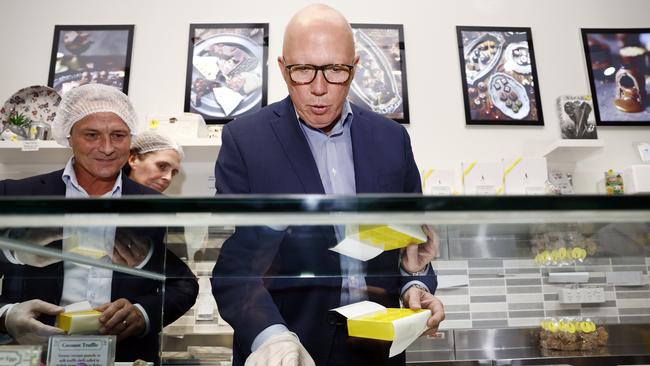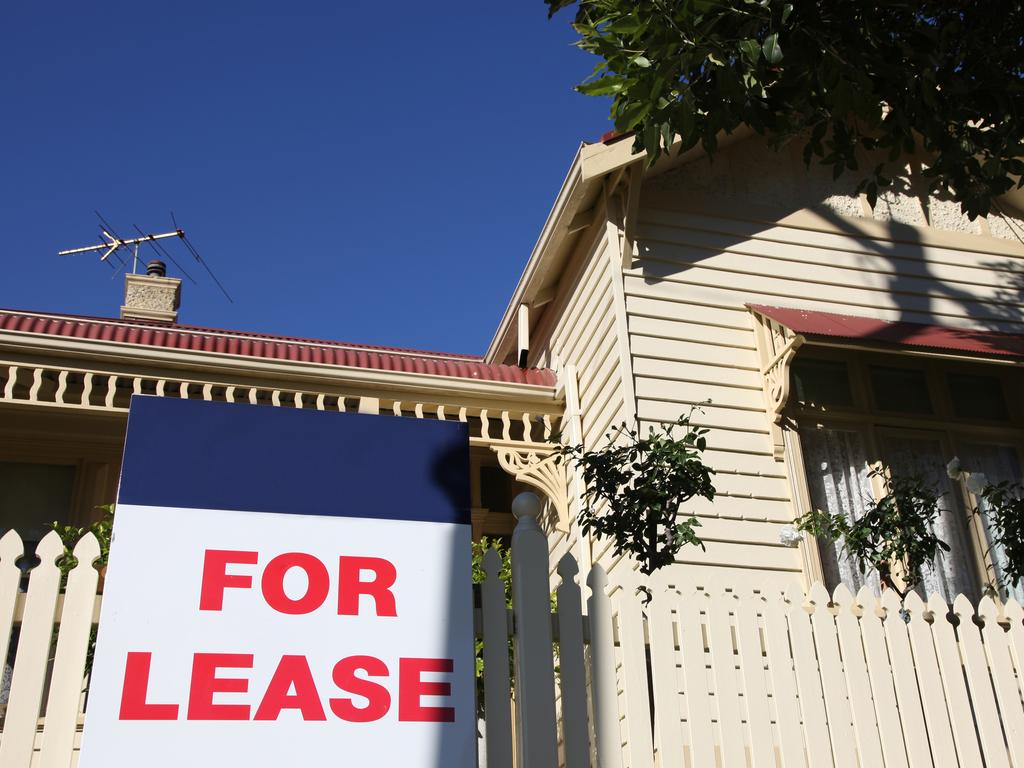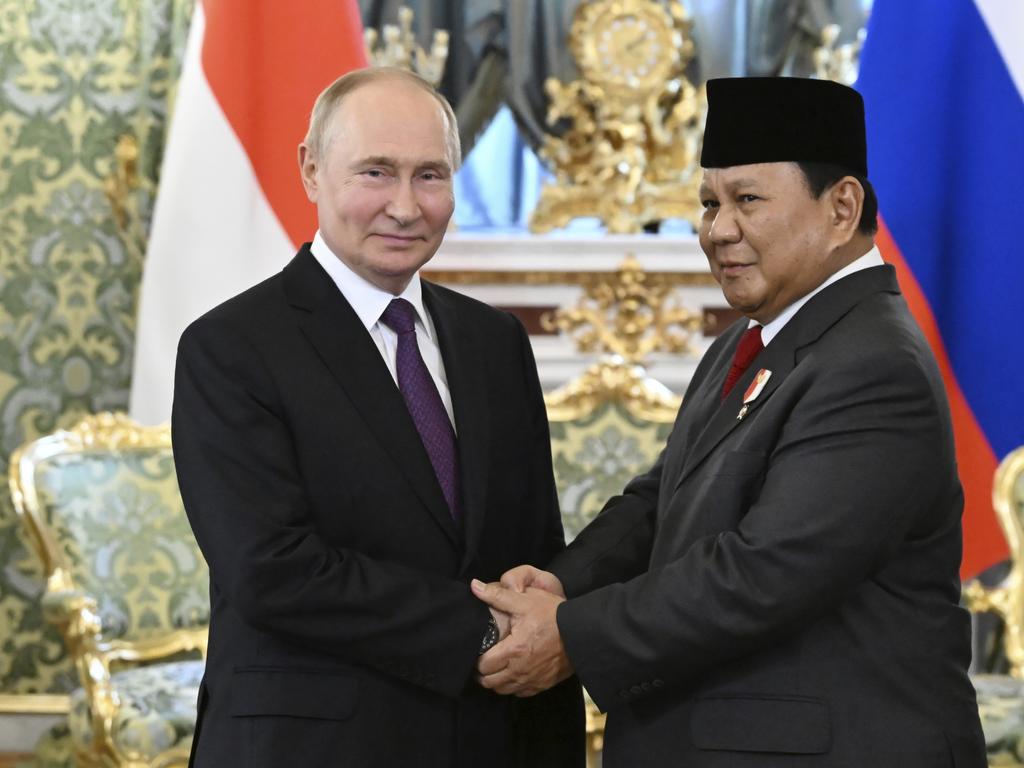Election 2025: Peter Dutton pledges series of small-business tax sweeteners
In a pre-election pitch to small business, the Opposition Leader on Saturday will pledge to introduce a three-year tapered tax offset for new enterprises if the Coalition wins the May 3 election.

Peter Dutton has launched a pre-election pitch to small business, offering a three-year tapered tax offset for new enterprises, as pressure builds on the Coalition to deliver broader tax reform following its aspirational vow to end bracket creep.
With the owners of Australia’s 2.6 million small firms forming a key constituency for the Coalition, the Opposition Leader on Saturday will pledge to introduce a series of tax sweeteners costing $330m to “rebuild small businesses and revive entrepreneurship” if he wins the May 3 election.
Under the proposed changes, newly incorporated businesses with a turnover of less than $10m would benefit from an offset on the first $100,000 of their taxable income, and a smaller offset applying to the next $100,000.
The rebate, known as the “Entrepreneurship Accelerator”, will phase out over the first three years of a business’s operations, with the existing marginal tax rate – 25 per cent for small businesses or 30 per cent for larger corporations – continuing to apply to income not covered by the offset.

On the first $100,000 of income earned, newly incorporated businesses would pay tax on just 25 per cent of this portion in the first year, rising to 40 per cent in the second year, and to 50 per cent in the third.
Those same businesses would pay tax on 50 per cent of the next $100,000 of their income in their first year of operations, rising to 60 per cent the following year and then 70 per cent in the third.
Any income above $200,000 would continue to be taxed as normal.
Separately, Mr Dutton will also unveil a new “tech booster” tax deduction worth $2000.
The scheme will allow businesses with a turnover of up to $10m to write off eligible purchases, such as software, marketing and cybersecurity programs, valued at more than $4000.
Businesses will be allowed to qualify for multiple offsets on their tax liability in a given year.
The twin tax measures are expected to cost $330m in foregone revenue over the four-year forward estimates period, yet the opposition did not detail the expected take-up of the two policies.
The Coalition will also set an aspirational target to increase the number of small enterprises by 350,000 over the four years from mid-2025, requiring an increase in business creation, a decline in closures, or a combination of both.
On its most recent measure, the number of new businesses outstripped those that shuttered by more than 73,000 in the 2023-24 financial year, according to business entries and exits data released by the Australian Bureau of Statistics.
The opposition’s new policies to win over business complement a series of existing measures designed to support small and family enterprises that have experienced a sharp increase in their input costs in recent years.
Earlier this year, Mr Dutton pledged to allow small businesses with a turnover of up to $10m to claim off the cost of meal and entertainment expenses, up to $20,000, from fringe benefits tax, and has promised to make the existing instant asset write-off permanent.
Rebuffing the demands of key business stakeholders, the Coalition has refused to roll back much of Labor’s industrial relations agenda, including changes to labour hire and the introduction of multi-employer bargaining.
Mr Dutton also faces calls to address Australia’s broader tax mix, which is becoming more heavily reliant on levying personal incomes, after he issued an aspirational vow to index tax thresholds to end bracket creep.
Bracket creep occurs when wages growth pushes a greater portion of workers’ pay into higher tax brackets.
Among the 38 OECD member countries, just four, including Australia, do not automatically adjust their tax brackets.
With the changes expected to blow a multibillion-dollar hole in the nation’s finances, veteran budget watcher Chris Richardson was supportive of Mr Dutton’s proposal, and argued that removing this “sneaky” flow of higher personal income tax receipts could spur a much-needed rejig of Australia’s tax settings.
“We could end up with politicians and an electorate who are forced into actually taking some of the harder decisions,” he said.
Business leaders similarly welcomed the Coalition’s vow to eliminate bracket creep, with Australian Chamber of Commerce and Industry chief Andrew McKellar also arguing the measure should be paired with broader tax changes.
“It has been a quarter of a century since anyone has seriously attempted this tax reform. So it does need to be a priority,” Mr McKellar said. “The balance between income tax and other taxes, including a number of state taxes as well, things like payroll tax, those are fundamental issues to be addressed.”







To join the conversation, please log in. Don't have an account? Register
Join the conversation, you are commenting as Logout